The Intel Core i9-9900KS Review: The 5 GHz Consumer Special
by Dr. Ian Cutress on October 31, 2019 10:45 AM ESTCPU Performance: Encoding Tests
With the rise of streaming, vlogs, and video content as a whole, encoding and transcoding tests are becoming ever more important. Not only are more home users and gamers needing to convert video files into something more manageable, for streaming or archival purposes, but the servers that manage the output also manage around data and log files with compression and decompression. Our encoding tasks are focused around these important scenarios, with input from the community for the best implementation of real-world testing.
All of our benchmark results can also be found in our benchmark engine, Bench.
Handbrake 1.1.0: Streaming and Archival Video Transcoding
A popular open source tool, Handbrake is the anything-to-anything video conversion software that a number of people use as a reference point. The danger is always on version numbers and optimization, for example the latest versions of the software can take advantage of AVX-512 and OpenCL to accelerate certain types of transcoding and algorithms. The version we use here is a pure CPU play, with common transcoding variations.
We have split Handbrake up into several tests, using a Logitech C920 1080p60 native webcam recording (essentially a streamer recording), and convert them into two types of streaming formats and one for archival. The output settings used are:
- 720p60 at 6000 kbps constant bit rate, fast setting, high profile
- 1080p60 at 3500 kbps constant bit rate, faster setting, main profile
- 1080p60 HEVC at 3500 kbps variable bit rate, fast setting, main profile
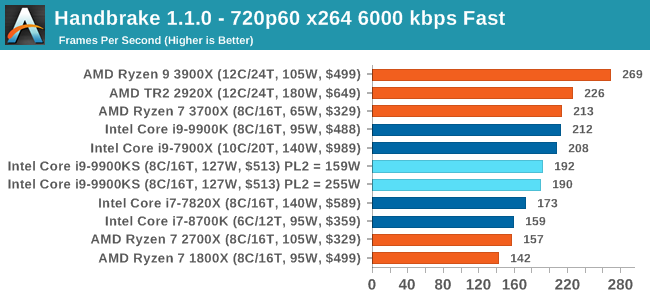
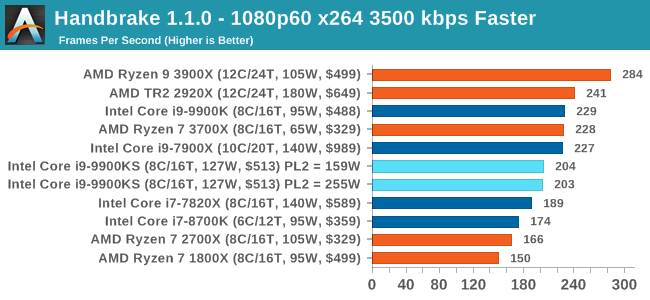
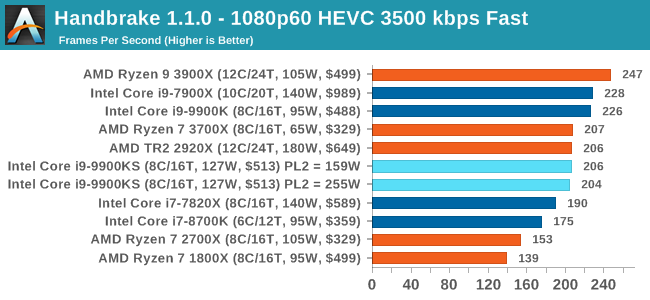
The 9900KS performed worse than our 9900K in our Handbrake tests, and we're not entirely sure why. It might be related to the regression we saw with DigiCortex.
7-zip v1805: Popular Open-Source Encoding Engine
Out of our compression/decompression tool tests, 7-zip is the most requested and comes with a built-in benchmark. For our test suite, we’ve pulled the latest version of the software and we run the benchmark from the command line, reporting the compression, decompression, and a combined score.
It is noted in this benchmark that the latest multi-die processors have very bi-modal performance between compression and decompression, performing well in one and badly in the other. There are also discussions around how the Windows Scheduler is implementing every thread. As we get more results, it will be interesting to see how this plays out.
Please note, if you plan to share out the Compression graph, please include the Decompression one. Otherwise you’re only presenting half a picture.
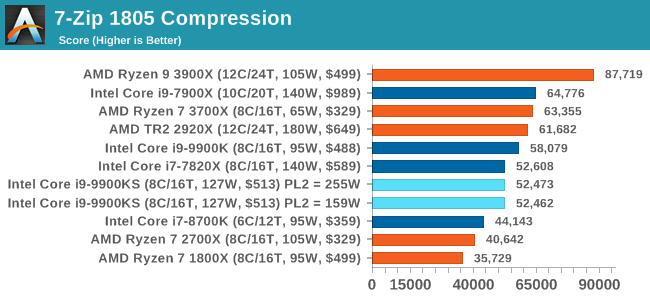
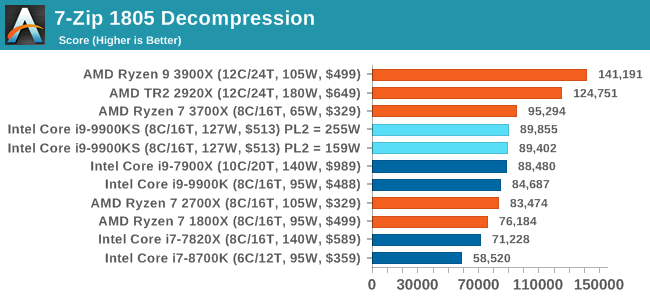
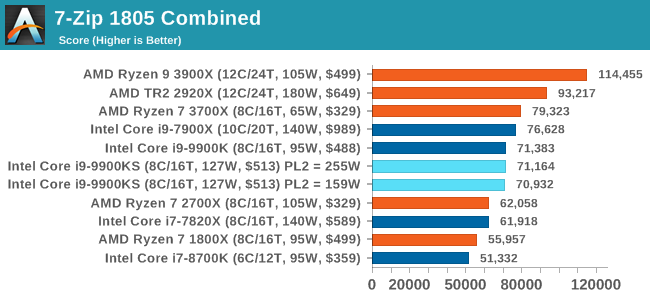
Both the 9900KS settings perform identically here, however the Compression test shows a performance regression compared to the standard 9900K. It does make me wonder if there are additional differences between the two chips (such as an internal clock).
WinRAR 5.60b3: Archiving Tool
My compression tool of choice is often WinRAR, having been one of the first tools a number of my generation used over two decades ago. The interface has not changed much, although the integration with Windows right click commands is always a plus. It has no in-built test, so we run a compression over a set directory containing over thirty 60-second video files and 2000 small web-based files at a normal compression rate.
WinRAR is variable threaded but also susceptible to caching, so in our test we run it 10 times and take the average of the last five, leaving the test purely for raw CPU compute performance.
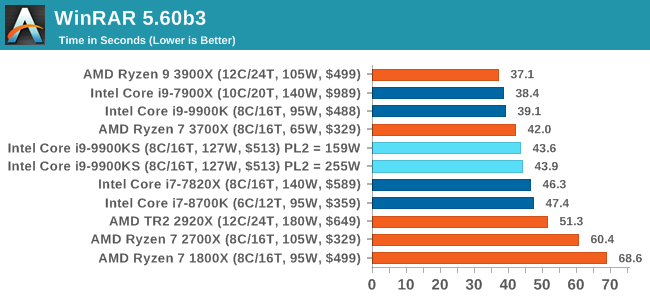
AES Encryption: File Security
A number of platforms, particularly mobile devices, are now offering encryption by default with file systems in order to protect the contents. Windows based devices have these options as well, often applied by BitLocker or third-party software. In our AES encryption test, we used the discontinued TrueCrypt for its built-in benchmark, which tests several encryption algorithms directly in memory.
The data we take for this test is the combined AES encrypt/decrypt performance, measured in gigabytes per second. The software does use AES commands for processors that offer hardware selection, however not AVX-512.
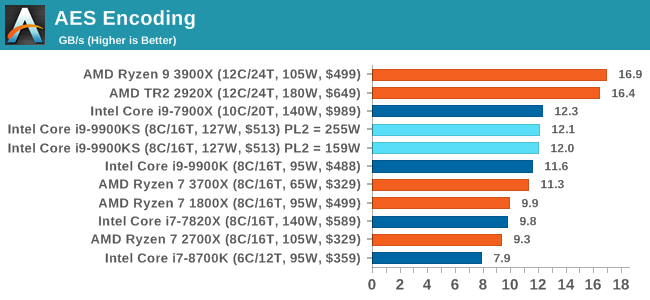










235 Comments
View All Comments
Agent Smith - Friday, November 1, 2019 - link
Only one year warranty with this CPU, reduced from 3yrs. So it’s marginally faster, uses more power, offers no gaming advantages and it’s price hike doesn’t justify the performance gain and warranty disadvantage over 9900k.... and the 3950x is about to arrive. Mmm?
willis936 - Friday, November 1, 2019 - link
Counter strike really needs to be added to benchmarks. It’s just silly how useless these gaming benchmarks are. There is virtually nothing that separates any of the processors. How can you recommend it for gaming when your data shows that a processor half the price is just as good? Test the real scenarios that people would want to use this chip.Xyler94 - Friday, November 1, 2019 - link
It's more because you need a specific set of circumstances these days to see the difference in gaming that's more than margin of error.You need at least a 2080, but preferably a 2080ti
You need absolutely nothing else running on the computer other than OS, Game and launcher
You need the resolution to be set at 1080p
You need the quality to be at medium to high.
then, you can see differences. CS:GO shows nice differences... but there's no monitor in the world that can display 400 to 500FPS, so yeah... Anandtech still uses a 1080, which is hardly taxing to any modern CPU, that's why you see no differences.
willis936 - Friday, November 1, 2019 - link
csgo is a proper use case. It isn’t intense, graphically, and people regularly play with 1440p120. Shaving milliseconds off input to display latency matters. I won’t go into an in depth analysis to why, but imagine a human response time has a gaussian distribution and whoever responds first wins. Even if the mean response time is 150 ms, if the standard deviation is 20 ms and your input to display latency is 50 ms then there are gains to cutting 20, 10, even 5 ms off of it.And yes, more fps does reduce input latency, even in cases where the monitor refresh rate is lower than the fps.
https://youtu.be/hjWSRTYV8e0
Xyler94 - Tuesday, November 5, 2019 - link
If you visually can't react fast enough, doesn't matter how quickly the game can take an input, you're still limited on the information presented to you. 240hz is the fastest you can go, and 400FPS vs 450FPS isn't gonna win you tournaments.CS:GO is not a valid test, as there's more to gaming than FPS. Input lag is more about the drivers and peripherals, and there's even lag between your monitor and GPU to consider. But go on, pretend 50FPS at 400+ makes that huge of a difference.
solnyshok - Friday, November 1, 2019 - link
No matter what GHz, buying a 14nm/PCIE3 chip/mobo just before 10nm/PCIE4 comes to the market... Seriously? Wait another 6 months.mattkiss - Friday, November 1, 2019 - link
10nm/PCIe 4 isn't coming to desktop next year, where did you hear that?eek2121 - Friday, November 1, 2019 - link
The 3700X is totally trolling Intel right now.RoboMurloc - Friday, November 1, 2019 - link
I dunno if anyone mentioned yet, but the KS has additional security measures to mitigate exploits which are probably causing the performance regressions.PeachNCream - Friday, November 1, 2019 - link
I expect I will never own an i9-9900KS or a Ryzen 7 3700X, but it is interesting to see how close AMD's 65W 8 core chip gets to Intel's 127+W special edition CPU in terms of performance in most of these benchmarks.